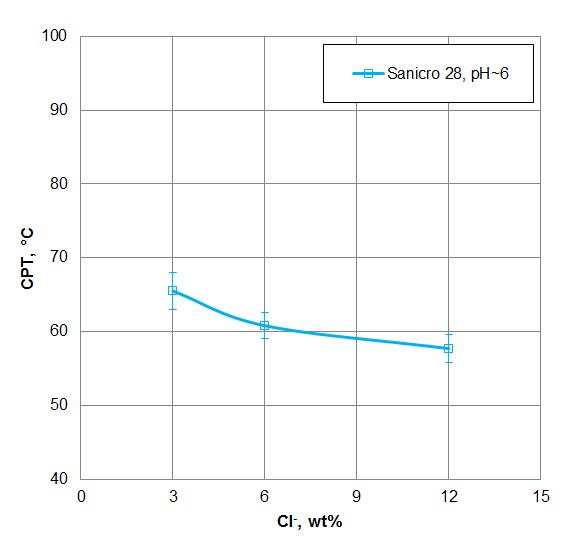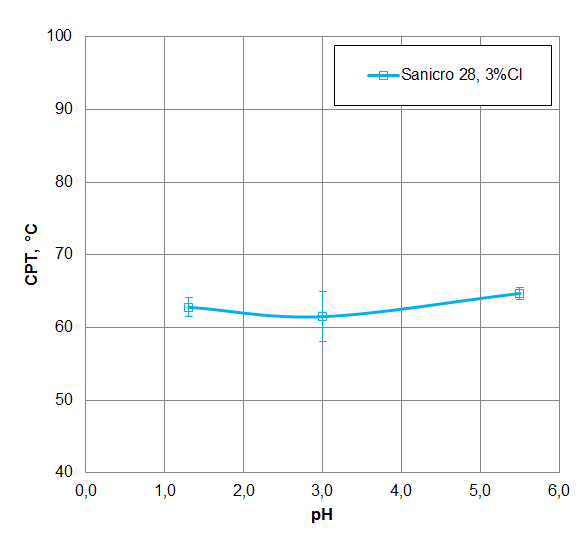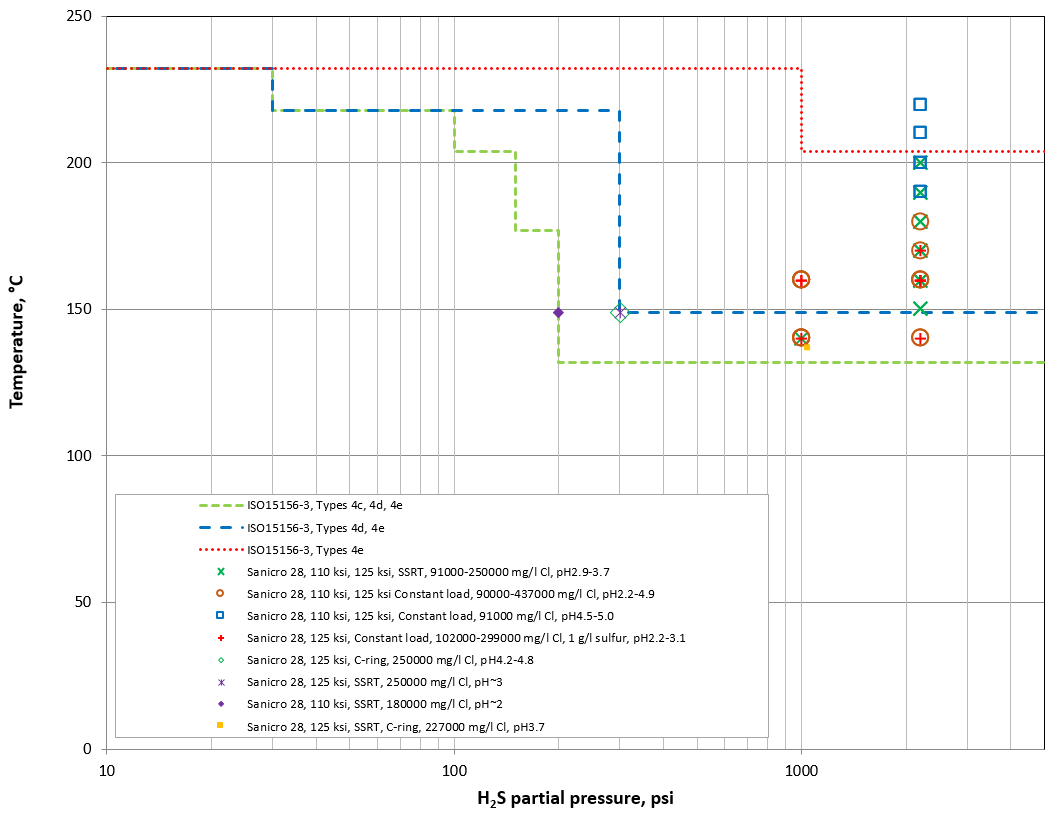Sanicro® 28 is a high-alloy austenitic stainless steel for OCTG downhole applications in particularly corrosive conditions. The grade is characterized by:
- Very good resistance to sulphide stress cracking and stress corrosion cracking (SCC) in chloride and sour (H2S/Cl-) environments
- Very high resistance to pitting and crevice corrosion
Standards
- UNS: N08028
- ISO: 4563-080-28-I
Product standards
| Seamless tubes used as casing, tubing and coupling stock: | ISO 13680, PSL-1 and PSL-2 |
| API spec 5CRA |
Approvals
- NACE MR0175/ISO 15156-3 (Petroleum and natural gas industries - Materials for use in H2S-containing environments in oil and gas production)
- Sanicro® 28, grade 110 ksi and grade 125 ksi, can be delivered with API-5CRA Monogram (License Number 5CRA-0016)
Chemical composition (nominal)
| C | Si | Mn | P | S | Cr | Ni | Mo | Cu | N |
|---|---|---|---|---|---|---|---|---|---|
| ≤0.020 | ≤0.7 | ≤2.0 | ≤0.020 | ≤0.015 | 27 | 31 | 3.5 | 1.0 | ≤0.1 |
Applications
Sanicro® 28 is used for high strength downhole production tubing, casing, and liners in sour gas wells. This includes environments with high temperatures, high partial pressures of CO2 and H2S, and high chloride concentrations.
Corrosion resistance
Pitting corrosion
Sanicro® 28 can withstand high temperatures in aggressive environments without pitting. A recognized method of ranking a material's susceptibility to localized corrosion is by means of the PRE number (Pitting Resistance Equivalent). This PRE number is based on the contents of chromium, molybdenum and nitrogen in the alloy according to the following formula:
PRE = %Cr + 3.3 × %Mo + 16 × %N
A PRE number is the relative measure of a material's ability to resist pitting corrosion in chloride containing environments. Sanicro®28 has a minimum PRE number of 38, which confirms its high resistance to pitting corrosion when chlorides are present.
Critical pitting temperature (CPT) was determined on cold worked Sanicro® 28 per modified ASTM G150. The temperature of the test solution was started at 20°C, and heated at a rate of 1 °C/min. The tests were carried out in NaCl solutions of three chloride concentrations without pH adjustment; and also in 3 wt% Cl- with three fixed pH. The solution of 1.7 liters was purged with nitrogen during the test. The assessments were carried out at a potential of +634 mV vs. Ag/AgCl on triplicate specimens per test environment. The high CPT suggests the high pitting corrosion resistance of the material in the environments tested.
 Figure 1. Critical pitting temperature (CPT) as a function of chloride concentrations for cold-worked Sanicro® 28. The potential was +634 mV vs Ag/AgCl.
Figure 1. Critical pitting temperature (CPT) as a function of chloride concentrations for cold-worked Sanicro® 28. The potential was +634 mV vs Ag/AgCl.
 Figure 2. Critical pitting temperature (CPT) as a function of pH for cold worked Sanicro® 28 in a 3% Cl- solution. The potential was +634 mV vs Ag/AgCl.
Figure 2. Critical pitting temperature (CPT) as a function of pH for cold worked Sanicro® 28 in a 3% Cl- solution. The potential was +634 mV vs Ag/AgCl.
Stress corrosion cracking (SCC)
Environmental assisted cracking, especially in the presence of hydrogen sulphide (H2S), is one of the more serious forms of corrosion in sour environments. Failure of tubing by environmental assisted cracking can occur rapidly without any warning. For that reason, the prevention of this form of corrosion must be considered when selecting tubing materials for sour wells.
According to ISO 15156-3 (2015), cold worked Sanicro® 28 belongs to type 4c material which can be safely used in the limited environmental combinations of temperature and H2S in order to avoid the risk of SCC. Laboratory test data shows that cold worked Sanicro® 28 tube materials are not susceptible to SCC in sour environments, even outside of the limits for 4c type materials.
Figure 3 illustrates SCC testing on Sanicro® 28 in Cl-H2S-CO2 environments with and without elemental sulfur in comparison with ISO 15156-3 limits for type 4c materials (under the green dashed line), type 4d materials (under the blue dashed line), and type 4e materials (under the red dashed line). The SCC testing has been performed on cold worked (minimum yield strength 110 ksi) Sanicro® 28 stressed at 100% actual yield strength (AYS) using tensile constant load per NACE TM 177 method A, as well as slow strain rate test (SSRT) per NACE TM0198 at strain rate of 4×10-6 in/in/sec. Sanicro® 28 showed good ductility in the tested sour environments without pitting and secondary cracks.
 Figure 3: SCC testing data of cold worked Sanicro® 28 tube materials in sour environments in comparison with the ISO 15156-3 limits for 4c type materials. The SCC testing has been performed on Sanicro® 28 tube materials stressed at 100% actual yield strength (AYS) using tensile constant load per NACE TM0177 method A, C-ring per NACE TM0177 method C, as well as slow strain rate test (SSRT) per NACE TM0198 at strain rate of 4×10-6 in/in/sec. Sanicro® 28 showed good ductility in the tested sour environments with no failures.
Figure 3: SCC testing data of cold worked Sanicro® 28 tube materials in sour environments in comparison with the ISO 15156-3 limits for 4c type materials. The SCC testing has been performed on Sanicro® 28 tube materials stressed at 100% actual yield strength (AYS) using tensile constant load per NACE TM0177 method A, C-ring per NACE TM0177 method C, as well as slow strain rate test (SSRT) per NACE TM0198 at strain rate of 4×10-6 in/in/sec. Sanicro® 28 showed good ductility in the tested sour environments with no failures.
Stress corrosion cracking tests have also been performed in the presence of elemental sulfur. Cold worked Sanicro® 28 tube with an Rp0.2 value of 889 MPa (129 ksi) has been tested. The tests were performed, according to NACE TM0177, with tensile specimens stressed to 100% of the actual yield strength.
| Temperature | pH2S | pCO2, psi | Chlorides (Cl-) | Elemental sulfur | Stress corrosion cracking |
|---|---|---|---|---|---|
| °C (°F) | psi (MPa) | (MPa) | mg/l | g/l | |
| 140 (284) | 2200 (15.2) | 1000 (6.9) | 102000 | 1 | No |
| 160 (320) | 2200 (15.2) | 1000 (6.9) | 102000 | 1 | No |
| 170 (338) | 2200 (15.2) | 1000 (6.9) | 102000 | 1 | No |
| 160 (320) | 2200 (15.2) | 1000 (6.9) | 299000 | 1 | No |
Fabrication
Sanicro® 28 tubes are supplied in the cold worked condition and are intended for use with threaded connections.
Forms of supply
Materials for oil and gas production
Cold hardened (cold worked) seamless tube and pipe
For production tubing, casing, liner, and coupling stock for downhole oil and gas applications, Sanicro® 28 is supplied cold hardened with high strength properties. (Sanicro® 28-110ksi, -125ksi)
Full details on sizes, finishes and mechanical properties are available on request.
Email: stog.smt@alleima.com
Heat treatment
Tubes for downhole oil and gas applications are delivered in the high strength, cold hardened condition. They are not annealed after cold working.
Mechanical properties
At 20°C (68°F)
| Grade | Proof strength | Tensile strength | Elong. | Hardness | ||
|---|---|---|---|---|---|---|
| Rp0.2a) | Rm | A2" | HRC | |||
| MPa | ksi | MPa | ksi | % | ||
| min | min | min | max | |||
| PSL-1 Sanicro® 28-110 | 760 - 965 | 110 - 140 | 795 | 115 | 11 | 35 |
| PSL-1 Sanicro® 28-125 | 860 - 1035 | 125 - 150 | 895 | 130 | 10 | 37 |
| PSL-2 Sanicro® 28-110 | 760 - 965 | 110 - 140 | 795 | 115 | 11 | 33 |
| PSL-2 Sanicro® 28-125 | 860 - 1000 | 125 - 145 | 895 | 130 | 10 | 35 |
1 MPa = 1 N/mm2
a) Rp0.2 correspond to 0.2% offset yield strength.
At high temperatures
Cold-worked Sanicro® 28 also displays very good mechanical properties at higher temperatures. Further information is available on request. Email:stmo.smt@alleima.com
| Temperature, °C | De-rating factor* | Temperature, °F | De-rating factor* |
|---|---|---|---|
| 20 | 1.00 | 68 | 1.00 |
| 50 | 0.97 | 100 | 0.98 |
| 100 | 0.92 | 200 | 0.93 |
| 150 | 0.89 | 300 | 0.89 |
| 200 | 0.88 | 400 | 0.88 |
| 250 | 0.87 | 500 | 0.87 |
*) Approximate yield strength at temperature is received by multiplying the corresponding de-rating factor and yield strength at 20oC (68oF).
Impact strength
Due to its austenitic microstructure, Sanicro® 28 has very good impact strength, both at room temperature and at lower temperatures. Tests have demonstrated that the steel readily fulfills the requirements in accordance with ISO 13680 (min. 40 J at -10oC (50oF)).
Physical properties
Physical properties of cold-worked Sanicro® 28.
Density: 8.0 g/cm3, 0.29 lb/in3
Relative magnetic permeability
1.003 (approximate value)
| Metric units | Imperial units | ||
| Temperature, °C | W/(m °C) | Temperature, °F | Btu/(ft h °F) |
|---|---|---|---|
| 20 | 11 | 68 | 6.5 |
| 50 | 11 | 100 | 6.5 |
| 100 | 12 | 200 | 7 |
| 150 | 13 | 300 | 7.5 |
| 200 | 14 | 400 | 8.5 |
| 250 | 15 | 500 | 9 |
| 300 | 16 | 600 | 9.5 |
| Metric units | Imperial units | ||
| Temperature, °C | J/kg °C | Temperature, °F | Btu/lb °F |
|---|---|---|---|
| 20 | 460 | 68 | 0.11 |
| 50 | 470 | 100 | 0.11 |
| 100 | 480 | 200 | 0.12 |
| 150 | 495 | 300 | 0.12 |
| 200 | 505 | 400 | 0.12 |
| 250 | 515 | 500 | 0.12 |
| 300 | 525 | 600 | 0.13 |
| Metric units | Imperial units | ||
| Temperature, °C | µΩm | Temperature, °F | µΩin. |
|---|---|---|---|
| 20 | 0.98 | 68 | 38.7 |
| 100 | 1.00 | 200 | 39.3 |
| 150 | 1.00 | 300 | 39.4 |
| 200 | 1.01 | 400 | 39.9 |
| 250 | 1.04 | 500 | 41.3 |
| 300 | 1.10 | 600 | 44.2 |
| Metric units | Imperial units | ||
| Temperature, °C | Per °C | Temperature, °F | Per °F |
|---|---|---|---|
| 30-50 | 13 | 86-120 | 7.5 |
| 30-100 | 14.5 | 86-200 | 8 |
| 30-150 | 15 | 86-300 | 8.5 |
| 30-200 | 15.5 | 86-400 | 8.5 |
| 30-250 | 15.5 | 86-500 | 8.5 |
| 30-300 | 15.5 | 86-600 | 8.5 |
1) Mean values in temperature ranges (×10-6)
| Metric units | Imperial units | ||
| Temperature, °C | MPa | Temperature, °F | ksi |
|---|---|---|---|
| 20 | 195 | 68 | 28.3 |
| 100 | 190 | 200 | 27.6 |
| 200 | 182 | 400 | 26.3 |
| 300 | 174 | 600 | 25.1 |
1) (×103)
Poisson's ratio
The Poisson's ratio is 0.29 for Sanicro® 28 at room temperature.
Disclaimer: Recommendations are for guidance only, and the suitability of a material for a specific application can be confirmed only when we know the actual service conditions. Continuous development may necessitate changes in technical data without notice. This datasheet is only valid for Alleima materials.